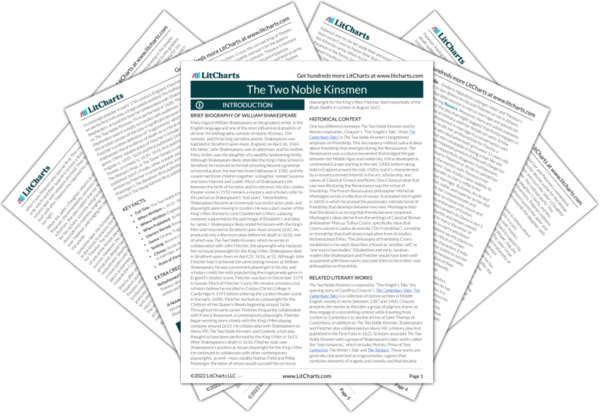Flowers symbolize growth, rebirth, and renewal. Flower imagery is abundant throughout the play, which takes place during the springtime. For example, Act 1, Scene 1 opens on Theseus and Hippolyta’s wedding procession with a boy singing a song about the flowers he scatters at the couple’s feet. The song’s lyrics describe the blooming flowers that mark the onset of spring and are evidence of the natural renewed growth the earth experiences as winter transitions into spring. When the boy places flowers at Theseus and Hippolyta’s feet, he symbolically blesses their marriage, imbuing it with the regenerative power of new beginnings reflected in the blooming of springtime flowers. Similarly, when Arcite and Palamon first see Emilia, she is wandering through a garden, inspecting flowers. The presence of flowers in this scene symbolizes the onset of a new phase in Arcite and Palamon’s friendship, for it’s Emilia’s appearance that prompts the once-devoted friends to become rivals.
Flowers also symbolize fertility and sexuality. In Act 2, Scene 2, the same scene in which Arcite and Palamon first see Emilia, Emilia remarks how a rose captures “the very emblem of a maid.” She compares how a rose blooms for the gentle west wind and closes its petals to the violent, persistent north wind to the way women respond to their male suitors. Like the rose, women are receptive to gentle wooing but will reject suitors’ advances if they are too harsh and unthinking. In Emilia’s metaphor, the “chaste blushes” the rose reveals in its bloom represents female virginity. When Emilia prays to Diana in Act 5, Scene 3 and asks the goddess to show her a sign that she’s received Emilia’s prayers, a tree bearing a single rose appears. Emilia interprets the rose to mean that she will remain “unplucked,” or chaste. When the rose falls from the tree, Emilia sees it as a sign that Diana has “dischargest” her. Because Diana is a goddess associated with fertility and virginity, for release of Emilia foreshadows Emilia’s impending marriage to Arcite or Palamon and the loss of virginity that likely would follow the union.
Flowers Quotes in The Two Noble Kinsmen
It is the very emblem of a maid.
For when the west wind courts her gently,
How modestly she blows and paints the sun
With her chaste blushes! When the north comes near her,
Rude and impatient, then, like chastity,
She locks her beauties in her bud again,
And leave him to base briers.












